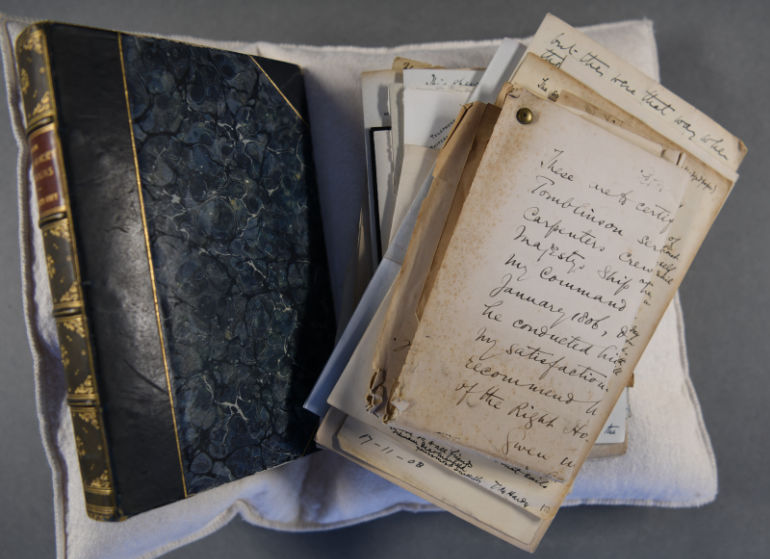Dorchester, History | Posted on November 23rd, 2021 | return to news
Shedding light on two men named Thomas Hardy
The Dorset History Centre in Dorchester has purchased items relating to the writer Thomas Hardy and Admiral Sir Thomas Masterman Hardy.

It can be a little confusing when you realise that there were two prominent men in Dorset called Thomas Hardy.
In addition to the writer Thomas Hardy there was Admiral Sir Thomas Masterman Hardy – and now new documents purchased by the Dorset History Centre – which is based in Dorchester – throw new light on their lives.
The items were funded jointly by Friends of the National Library and Dorset Archives Trust.
The first acquisition is a letter written in September 1927 by Florence Hardy to a Mr. Lea of Bockhampton portending Thomas Hardy’s death. This documents the deteriorating health of her husband and she tells of a ‘very able London Doctor’ Sir Henry Head who had retired to Dorset and who was being particularly attentive to Hardy. Sir Henry had advised that Hardy ‘ought not to see friends or any callers, two days in succession as the strain of a long conversation is very bad for his heart’. The letter is poignant in that it was written a little over four months before Hardy’s death on 14 January 1928 of a cardiac-related condition.
The second acquisition is a set of two letters concerning the arrangements of the burial of the author in Poet’s Corner in Westminster Abbey. The exchange is between the Dean of Westminster and the Vicar of Fordingdon, the Rev Richard Grosvenor Bartelot. Dean writes to Rev Bartelot that his decision to permit Hardy’s burial in Poet’s Corner ‘has given rise to a great deal of controversy. I am receiving every day furious protests on the ground that his teaching was anti-Christian and that he himself was not a Christian, that his moral standard was very low, etc.’. He goes on to say that having previously ignored the criticism but now he had received a letter from the ‘head of a great religious body’ so felt compelled to properly respond to Hardy’s detractors.
The Rev Bartelot replied that although convinced of Hardy’s essential Christianity, ‘he had never been able to penetrate the armour’ and that ‘he (Hardy) absolutely refused to be ;drawn’ on religious matters’. Hardy’s ashes were indeed interred in Westminster Abbey on 16 January 1928. Underscoring Hardy’s undying associations with Dorset, a spadeful of soil, supplied by a local farm labourer Christopher Corbin was sprinkled on the casket.
The third item acquired by DHC relates to Captain Thomas Hardy and is the proof copy of The Three Dorset Captains at Trafalgar by Broadley and Bartelot published in 1906. The book, now reprinted several times discusses the contributions at that critical sea battle of Captains Digby, Bullen and Hardy. The volume is particularly significant because it contains annotated changes to the text along with correspondence between the authors as well as a manuscript letter from Thomas Masterman Hardy, Portesham’s most famous son, Flag Captain of the Victory. Pasted into the front cover is a short note from Nelson himself (signing himself as the ‘Duke of Bronte’) in which he decries the ‘scoundrels’ who attacked the French ambassador’s carriage. This is an important piece of Dorset and the UK’s maritime history and it is now held at the History Centre for the public to access.
Carola Campbell, chairman of Dorset Archives Trust said The Trust was privileged to support the Dorset History Centre in purchasing these important documents. They provide fascinating and intimate information on two of Dorset’s most famous men, both named Thomas Hardy. This archival material has now been saved from obscurity and is accessible to all Dorset History lovers.”
Please share post:
Tags: #DorsetHistoryCentre, #ThomasHardy









